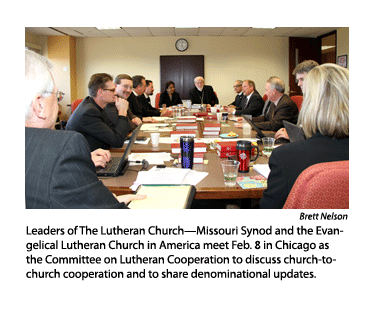CHICAGO — Leaders of The Lutheran Church–Missouri Synod and the Evangelical Lutheran Church in America (ELCA) met here Feb. 8 as the Committee on Lutheran Cooperation (CLC) to discuss church-to-church cooperation and to share denominational updates.
The LCMS, with about 2.3 million baptized members, is based in St. Louis. The ELCA is a 4.2-million-member church based in Chicago.

A significant portion of the half-day meeting was devoted to discussion of the impact of recent ELCA decisions on the ability of the LCMS to continue cooperative activity between the two church bodies in a way that maintains faithfulness and integrity to official positions of the Synod.
In particular, ELCA representatives to the CLC “wanted to know how the LCMS 2010 convention’s delegates’ adoption of Resolution 3-03 titled ‘To Cooperate in Externals with Theological Integrity’ and the work of the LCMS Praesidium in carrying out that resolution would affect joint cooperative ventures between the ELCA and LCMS,” said the Rev. Dr. Albert B. Collver III, the Synod’s director of Church Relations and assistant to LCMS President Rev. Dr. Matthew C. Harrison.
That LCMS convention action was in response to the 2009 ELCA Churchwide Assembly’s approval of opening ELCA ministries to gay and lesbian pastors and other professional workers living in committed same-sex relationships. That year’s ELCA assembly also approved a resolution that committed the ELCA to finding ways to allow congregations that chose to do so to recognize, support and hold publicly accountable life-long, monogamous, same-gender relationships.
Recently, Harrison sent letters to the ELCA stating that it would not be possible for the Synod to continue to work cooperatively with the ELCA on a national (church-to-church) level in Lutheran Disaster Response, military chaplaincy and institutional chaplaincy.
“It is with great sadness that external cooperation between the headquarters of the ELCA and the LCMS is coming to an end due to the approval by the ELCA in 2009 of sexual practices and relationships forbidden by the Holy Scriptures,” Harrison said after the CLC meeting. “The coming to the end of cooperative activities in areas such as military chaplaincy, institutional chaplaincy and disaster response is regrettable but necessary to maintain the integrity of the Scriptures and the position of the LCMS in an age where it is becoming more difficult to confess and speak publicly the historic Christian message.”
According to the Rev. Dr. Mark S. Hanson, ELCA presiding bishop, the ELCA has been committed to being engaged in conversation with the Missouri Synod.
“The Committee on Lutheran Cooperation has been a continual practice of the ELCA since its formation. We share … an identity of being Lutherans in this culture, and we have historically shared a commitment to respond to human need together — be it the need of refugees or those in the world who are experiencing disaster and the challenges of development,” Hanson said in an interview.
“While I regret that The Lutheran Church–Missouri Synod has taken action to discontinue our shared ministries, that work continues to be a priority for us as the ELCA with existing partners, and we will continue to look for ways to do that with Lutherans and ecumenical partners,” said Hanson.
The committee appointed a subgroup of two representatives from the LCMS and two from the ELCA to draft a charter for how it will constitute future meetings of the Committee on Lutheran Cooperation. That group also will propose dates for any future meetings of the CLC.
The leaders also shared updates regarding their denominations’ ecumenical endeavors, budget and finance, areas of concern and ministry focus, and international developments. The committee also received written reports from Lutheran Immigration and Refugee Service and Lutheran Services in America.
LCMS representatives at the CLC meeting — besides Harrison and Collver — were the Rev. Herbert C. Mueller, first vice-president; Chief Mission Officer Rev. Gregory K. Williamson; the Rev. Dr. Joel Lehenbauer, executive director of the Commission on Theology and Church Relations; Chief Administrative Officer Ron Schultz; and the Rev. Dr. Larry Stoterau, chairman of the Council of Presidents and president of the LCMS Pacific Southwest District.
Posted Feb. 20, 2012



